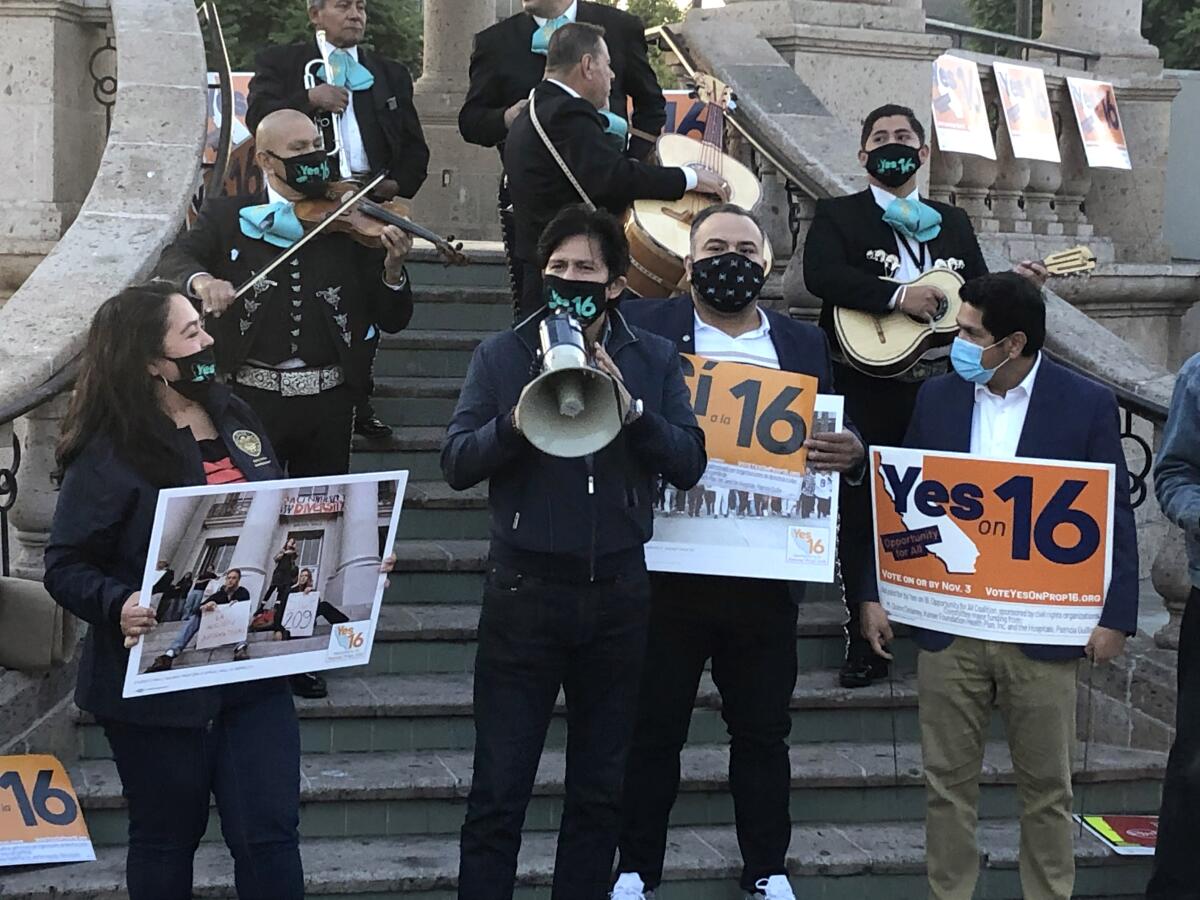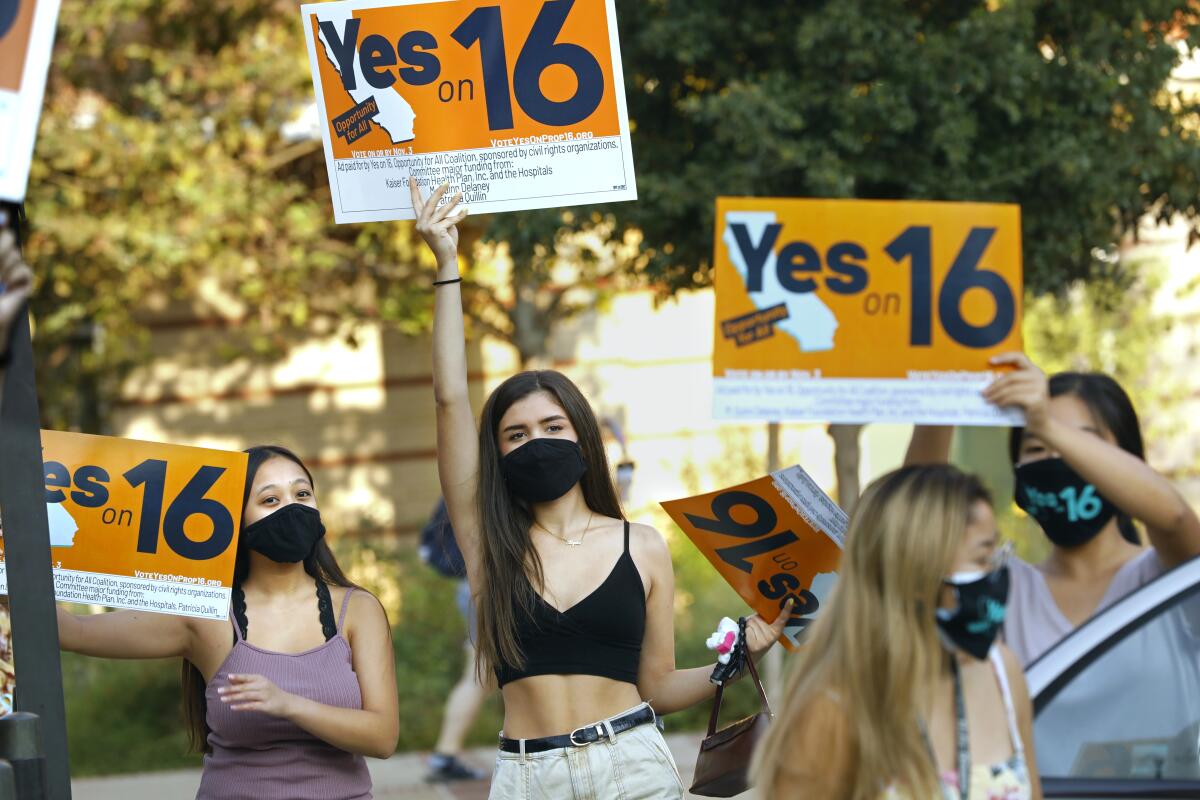Column: Latino ambivalence about affirmative action could doom Prop. 16

For my generation of Latinos, the mid-1990s felt like a series of gut punches delivered by the California electorate.
There was Prop. 187, then 209 and finally 227. Make life miserable for undocumented immigrants, ban affirmative action, then end bilingual education.
Voters gladly passed them in 1994, 1996, and 1998. If you were a Latino coming of age during this era, it felt like a big chunk of the Golden State was telling us we weren’t welcome here. That we were takers and contributed nothing. The coldly political language of the propositions did not fool you: You could hear in them a common and long familiar prejudice.
A generation later, the past that 187, 209 and 227 represented looks as imposing as a toppled Confederate monument.
Prop. 187 got vanquished in courts, and California declared itself a sanctuary state in 2017. Bilingual education is back. Now, Proposition 16 on this year’s ballot seeks to drive a stake into the ‘90s Hispanic hate parade once and for all by bringing back affirmative action.
This was the backdrop to an Oct. 26 rally at Mariachi Plaza in Boyle Heights that at first looked like politics at its most pandering.
A mariachi played the jaunty song “El Mariachi Loco” as a who’s who of Eastside power introduced themselves — we’re talking people like Assemblyman Miguel Santiago, State Sen. Maria Elena Durazo and Rep. Jimmy Gomez. They swayed and cheered as if a fiesta could conjure up affirmative action from the dead with days to go before election day.

They were college students and activists in 1996 who unsuccessfully fought against Proposition 209. Now, as some of the most powerful politicos in California, they wanted revenge.
“We lived the moment when they took [Proposition 209] away,” Los Angeles Councilmember and former State Senate pro tem Kevin De Leon said before the event. “We carry a sense of guilt. [Latinos] have made progress, but we would’ve made so much more.”
“209 is part of the trifecta of hate legislation in the ‘90s that we get to dismantle,” said Michele Siqueiros, president of the nonprofit Campaign for College Education. “For voters who feel frustrated against racism from yesterday and today, voting yes on 16 is something they can do.”
California is a vastly different place in no small part because these propositions rallied angry Latinos to the polls. Latinos are now the largest ethnic group in the state and make up a much larger portion of the electorate than in the ‘90s.
And yet...the polls and pundits say Prop. 16 is doomed.
The Latinx experience chronicled
Get the Latinx Files newsletter for stories that capture the multitudes within our communities.
You may occasionally receive promotional content from the Los Angeles Times.
The latest Berkeley ISG polls, released just a week before election day, showed only 38% of California voters supported the measure. Whites and Asians voters are overwhelmingly against its; Black voters support it.
Latinos? Only 40% of those surveyed sided with the pro-affirmative action measure.
That apathy was apparent at the Yes on 16 pachanga.
There were almost as many distinguished guests as there were attendees — and most of the audience seemed to be staffers. Pedestrians ambled by. A group of teens who had skateboarded around Mariachi Plaza just before the Yes on 16 event disappeared once it started.
But supporters weren’t too worried. At least that’s what they said.
“We vote late as a community,” said Los Angeles Community College District trustee Steven Veres. “That’s why things like this are important. If you talk to people for just one minute about it, they get it without a doubt.”
“We’re still in a pandemic,” Christian Arana, director of policy for the Latino Community Foundation, told me in a phone interview. “Suffice to say, we as a community haven’t had the luxury to sit down and comb through what Prop. 16 could do.”
Their optimism has history behind it. Only 42% of Latino voters surveyed in a Los Angeles Times poll a week before the 1996 election opposed Prop. 209 — but 76% of Latinos eventually voted against it.
The past 25 years, however, have seen Latinos advance in the state. Our numbers are nowhere near where they should be in terms of wealth and education, yet enough of us have made it so that affirmative action has become a general afterthought for many middle- and upper-class Latinos.
And surprisingly, some blue-collar Latinos can see affirmative action as an affront. Latinos who might believe they are the hardest working people around, and who have achieved a measure of success in the U.S. despite many obstacles, might well question the need for it.
That’s how I felt when I first heard about Proposition 209 as a high-school senior in the fall of 1996. Neither of my immigrant parents completed high school, yet they were able to buy a three-bedroom, two-bath, one swimming pool American dream home.
If they could do it, I thought, why couldn’t others? And why help those who couldn’t?
That’s the philosophy of Rosa Paniagua, a personal trainer from Woodland Hills and the daughter of Mexican immigrants. She and her friends, all Joe Biden supporters and mostly Latinas, were at a birthday party recently when a Yes on 16 ad appeared on the television that promised to “level the playing field in California.”
“We hated it,” said the 43-year-old mother of four. “It’s our culture to work hard and earn our living. You see people at the exit of freeways, and there’s a homeless guy and an immigrant selling oranges. I’m going to support the guy who sells oranges rather than give a dollar to the one with the sign.”
That rancho libertarianism mentality is a phenomenon that Prop. 209 author Ward Connerly hopes will guide Latinos toward defeating Prop. 16.
“People who thought it would be a soft sell were engaging in their own worst kind of bigotry,” said Connerly, a former UC regent. “It’s not surprising at all to me that once understood, Latinos will reject the call of affirmative action.”
Besides, Connerly argued, Latinos should reject the return of affirmative action in part because “if known and practiced, it will only separate them from the declining white and rising Asian” population and leave a state “simmering in chaos.”
I doubt that. Such doomsday rhetoric employed by Connerly and other opponents of affirmative action quickly made me change my mind on the matter as a youngster.
Arana said Latinos can find the term “affirmative action” nebulous, which is hurting Prop. 16. “You have to walk them through what a ‘Yes’ is,” he said. But polling by the Latino Community Foundation shows that when Prop. 16 is explained explicitly — as a way to get more Latinos into higher education instead of a vague definition of equality — voter support shoots up to 76%.
“It’s this understanding that we don’t all start in the same place, and that it’s important to help out our future,” he said.
That’s the message the Yes on 16 Mariachi Plaza people preached as they took their cause to the streets.
The mariachi played “La Marcha de Zacatecas,” a thundering instrumental that’s like a Bat Signal for Mexicans to stop whatever they’re doing and pay attention.
Cars slowed down and honked. Pedestrians gladly took fliers. Javier and Angelica Maldonado stopped to record the parade.
“Sixteen? You mean September 16?” Javier cracked, referring to Mexican Independence Day. Then he got serious. “Of course we’re going to vote for it,” said the 56-year-old Guadalajara native.
“Our son and his friends should have all the chances to succeed,” added Angelica.
East L.A residents Bryant Orta and Eunice Juarez, both 32, finished an early dinner at Casa Fina. Both knew about Prop. 16 but were noncommittal about their vote. “We do need to close the gap with other groups,” said Juarez, a psychotherapist.
“But we also need to get more competitive and make sure students aren’t set up to fail,” countered Orta, a music manager.
The sun was setting, and the Yes on 16 returned to their cars. Too much, too little, too late? We’ll find out soon enough.
More to Read
Sign up for Essential California
The most important California stories and recommendations in your inbox every morning.
You may occasionally receive promotional content from the Los Angeles Times.











